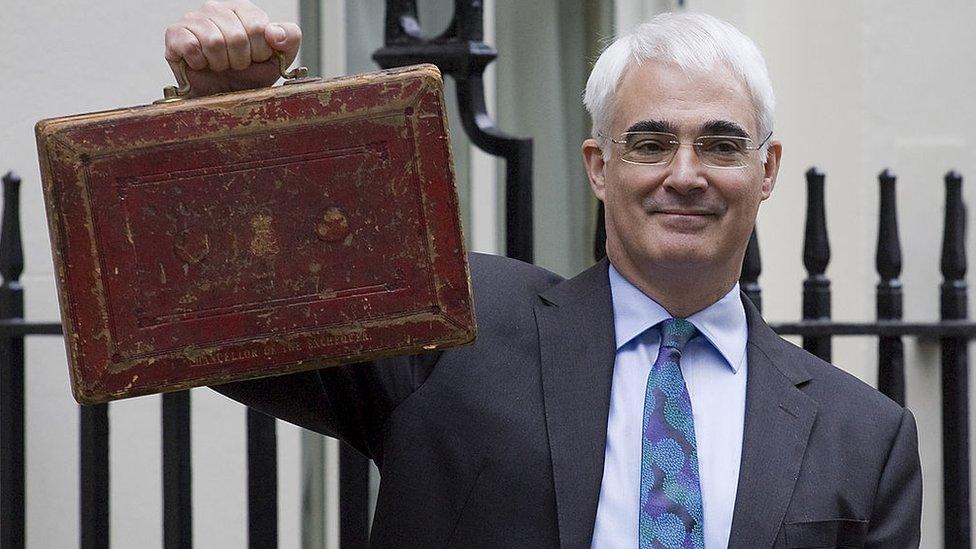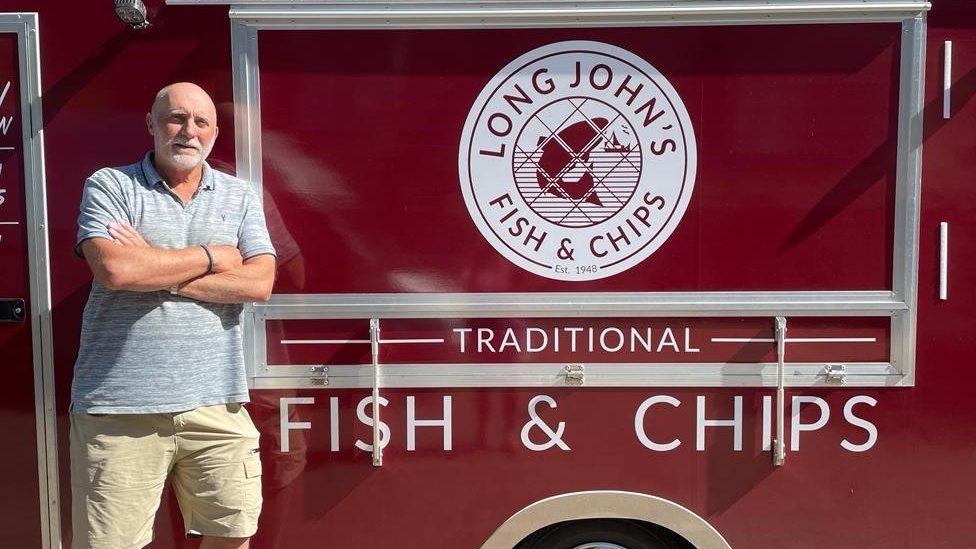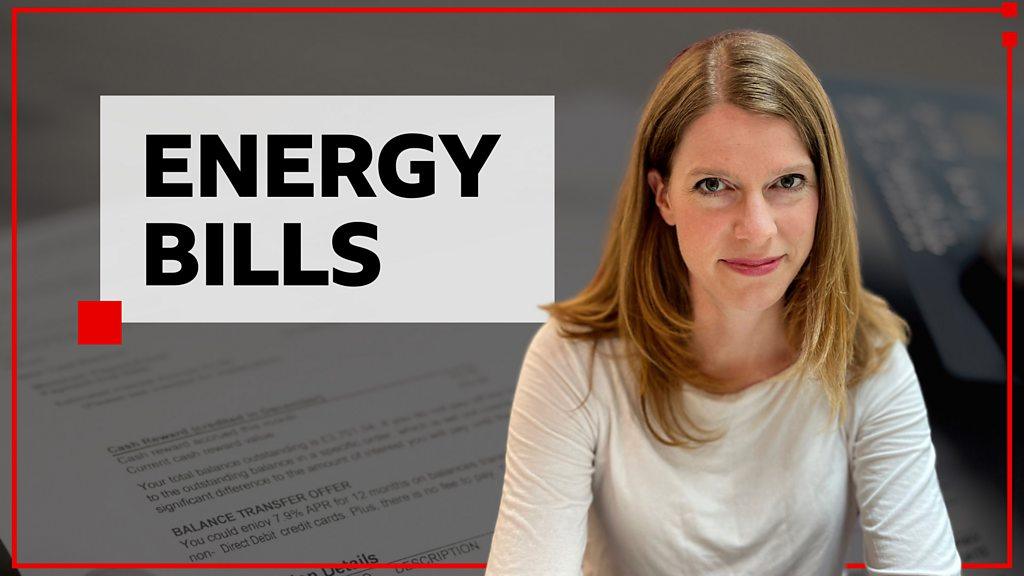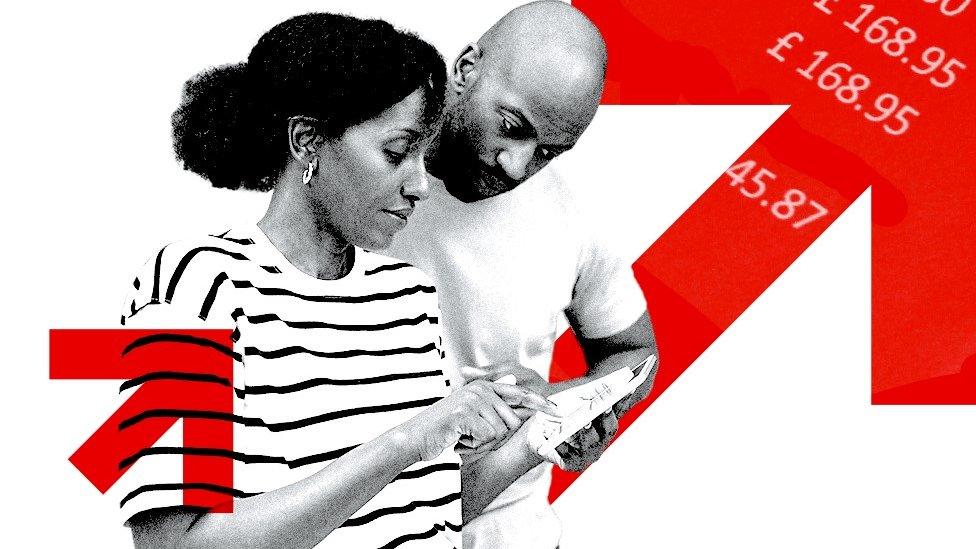Energy bills could break firms, warns ex-chancellor
- Published

Soaring energy bills could be the "straw that finally breaks the camel's back" for small businesses, former chancellor Alistair Darling has warned.
Mr Darling, who was Labour chancellor during the financial crisis, said "bold action" was needed to help the economy.
The energy price cap for households will soar by 80% from October.
But firms are not covered by the cap and Mr Darling said that after surviving Covid, energy costs risked finishing them off.
Mr Darling described the current situation as a "lethal cocktail" and said it required "bold action" to be taken by the government.
Both candidates in the Conservative Party leadership race, Liz Truss and Rishi Sunak, have come under pressure to outline further support for households and firms following the announcement that energy bills would rise again this Autumn.
The new leader - and prime minster to succeed Boris Johnson - will be announced next Monday.
Ms Truss has so far confirmed she will cut National Insurance and green levies on bills. Mr Sunak has proposed tax cuts on energy bills as part of a £10bn package.
It emerged at the weekend that Ms Truss is considering a "nuclear" option of cutting VAT by 5% as well as raising the threshold at which people start paying tax.
In May, the government announced £37bn worth of help for households with the rising cost of living.
But Mr Darling told the BBC's Today programme the government needed to announce more support.
"You've got to announce it now," he said.
"Frankly the stuff that's been announced so far might have passed muster earlier this year, it simply won't do now, you need something far more substantial."

Alistair Darling was chancellor of the exchequer during the 2008 financial crisis
Mr Darling said many firms, "especially the smaller ones who have been struggling through the whole Covid problems over the last couple of years may find that [the cost of energy] is the straw that finally breaks the camel's back".
He said: "My fear is if the government doesn't do something, you will not just have hardship for individuals and businesses, but you will find that people's spending goes down.
"And the risk is, at the moment people are saying the chances of us going into recession are 50-50. It could just tip us into recession, which of course would be disastrous for us."
He added: "One lesson I drew from what happened in 2008 is you've got to do more than people expect, and you've got to it more quickly than people expect, if it's going to work."
A spokesperson for the Treasury said it was "making the necessary preparations to ensure a new government has options to deliver additional support as quickly as possible, as the chancellor has made clear".
"And as the prime minister has made clear, no major fiscal decisions will be taken until the new prime minister is in post," they added.
On Friday, energy regulator Ofgem announced a rise in the energy price cap. It means a typical household will pay £3,549 a year for gas and electricity starting in October up from £1,971 currently. And some economists have warned that could rise even further.
Wholesale gas prices have been rising since last year but have worsened recently because of Russia's invasion of Ukraine and the Kremlin's decision to squeeze energy supplies to Europe.
Small businesses across a number of industries have voiced their concerns over rising energy bills.
More than 750 restaurant and café owners called on the government and Conservative leadership candidates for support through VAT cuts, grants and business rate rebates.
In an open letter, the signatories said takeaways were being quoted "eyewatering bills" that were "simply impossible to pay".
"The government has waited until the last moment to act before, but now cannot be one of those times.
"It must work with the Conservative leadership candidates on a plan to support Britain's smallest restaurants before it's too late," said Ibrahim Dogus, chair of the British Takeaway Campaign.
Jon Long, who runs five fish and chips shops in Dorset, told the BBC if he had to pay the current market rate for gas and electricity, it would mean the end his business after four generations in his family.
He managed to fix his gas and electric rates with his energy provider in 2021 and secured a two-year contract, but many businesses aren't in his position.

Jon Long runs five fish and chips shops in Dorset
"What seemed to be extortionate then now seems like an absolute steal," he said.
The 59-year-old said currently his average bill per shop is about £15,000 per year, but based on current wholesale prices, it would cost him up to £80,000.
"We are on a war footing here. There has been a lot of talk, a lot of sympathy, they (the government) have been listening but no action," he said.
"Businesses coming out of contracts need drastic help, and they need it now or we face losing thousands of previously viable businesses."
The Bank of England recently warned that the UK economy will fall into recession later this year as rising energy costs push up the rate of inflation. It recently raised interest rates by 0.5% - the biggest increase in 27 years - in an attempt to cool rising consumer prices which hit 10.1% in July.
Mr Darling said the financial crisis more than a decade ago was different to today's economic climate, but warned the current situation was "just as threatening to people, [and] to the economy as the financial crisis was back in 2008".
"It's not just people on low incomes who are going to be affected by this, it's going to be people right up the income chain," he said.
Related topics
- Published26 August 2022

- Published26 August 2022

- Published3 April 2024

